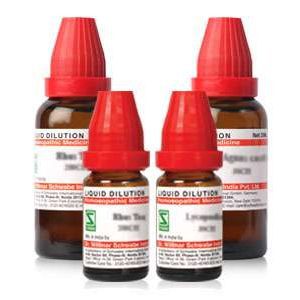
Chamodent For Teething: Are Homeopathy Teething Remedies Safe?
- Dr. Aditi Sharma
- July 20, 2022
- No Comments

Dentition or teething is an important milestone for an infant. However dentition period is not smooth for all children. In this article, we will focus on the role of homoeopathy in relieving dentition troubles.
What are the signs and symptoms of tooth decay?
The common signs and symptoms of teething are:-
- Crankiness or fussiness
- Increased salivation and drooling from the mouth
- Biting down or chewing on hard objects
- Sensitive or sore gums
Many times fever, flatulence, colic and diarrhoea are also associated with dentition.
What is normal dentition in children?
There is no exact timing of dentition for all children. Babies typically begin to have dentition by 6 months of age. By 2-3 years all the milk or primary teeth erupt. Later by 6 years of age all the milk teeth fall off and permanent teeth start to replace them. By about 21 years of age, all 32 permanent teeth erupt in a person in general.
Teething occurs in 5 stages. These are:-
Stage 1: (1-6months)
At birth, all 20 milk teeth or primary teeth are formed beneath the gums in the jawbone.
Stage 2: (6-8months)
At this stage, the first teeth begin to erupt although the discomfort or pain may begin before 6 months. The upper and lower incisors or front teeth begin to erupt. The uneven edges of the teeth push against the gums and may cause discomfort. The child tends to bite on hard objects at this stage. There may be drooling as well during this time.
Stage 3: (10-14months)
During this stage, primary molars begin to erupt in the upper and lower jaws. There may be an increase in drooling, irritability, and desire to chew on hard objects. There may also be fever, diarrhoea, decrease in appetite and disturbed sleep pattern at this stage.
Stage 4: (16-22months)
During this stage, the canines erupt in the lower and upper jaws.
Stage 5: (25-33months)
This is the most difficult period of dentition as the large molars erupt at this stage. The molars are the biggest teeth and normal pain-relieving techniques may no longer be effective.
What are management tips for difficult dentition?
These are:-
- Massage the baby’s gums to relieve the pain. This can be done with a clean and damp cloth or finger.
- Provide a teething ring made of hard rubber.
- Give a water-filled bottle to the baby to suck.
- Refrigerate cloth or teething ring for the baby to chew on. Don’t freeze these items as they can harm the teeth and gums.
- Give hard foods to the baby to chew on. Observe the baby closely to avoid any choking hazards.
- Clean the drool to avoid irritation of the skin.
Also Read 9 Ways to Keep Your Teeth Healthy
Are homeopathy teething remedies safe?
Homeopathic teething remedies are very safe and effective. They help to reduce the inflammation of gums and pain in teeth that are commonly found during the dentition period. Commonly associated physical symptoms such as colic, flatulence and diarrhoea can be effectively treated with homoeopathic medicines.
Homeopathic medicines also help to reduce the irritability and restlessness that occurs due to dentition trouble and calms the mind of the infants.
Not only this, homeopathic medicine also helps those kids who suffer from delayed dentition despite adequate calcium and vitamin D intake in their diet.
The best homeopathic medicine for various dentition-related troubles is constitutional medicine. For this, a trained homeopathic physician takes a detailed case history of the child. He takes into account signs and symptoms from both the mental and physical spheres of the child for holistic treatment of teething troubles. At times intrauterine history of the child is also elicited to find the right remedy.
What are the common homeopathic medicines for teething in infants?
- Belladonna– It is indicated for dentition problems with acute inflammation of the gums. There are red gums, flushing of the face and a sensation of heat. The baby tends to be restless and cries out during sleep.
- Chamomilla– It is indicated when the child is very sensitive to pain and becomes extremely cranky. The child may even scream and hit others around. Being carried and rocked constantly is the only thing that gives relief to the child. There may be greenish diarrhoea during the dentition phase in such children.
- Calcarea phosphorica– It is indicated when there is a delay in the dentition. There is aching in gums, stomachache, trouble sleeping, irritable temperament and picky eating habits in such children.
- Calcarea carbonica– It is indicated when the teeth are late to appear and then difficult and slow. It is indicated in babies who are fat, slow in learning to crawl and walk and tend not to have seating from heads while sleeping during the day or at night.
- Magnesia phosphorica- This is indicated for painful teething, where the pain is relieved by warmth and pressure. This can be elicited if the child feels better when biting an object hard or drinking warm water. Warm application held against the cheek also gives relief to the pain.
-
 Chamomilla CHSale Product on sale
Chamomilla CHSale Product on sale₹100.00₹82.00 -
 Calcarea carbonica CHSale Product on sale
Calcarea carbonica CHSale Product on sale₹100.00₹82.00 -
 Belladonna CHSale Product on sale
Belladonna CHSale Product on sale₹100.00₹82.00 -
 Calcarea phosphoricaSale Product on sale
Calcarea phosphoricaSale Product on sale₹110.00₹90.20
Frequently Asked Questions
1. What is Mama natura Chamodent?
Mama natura Chamodent is specially formulated homeopathic medicine which is given to children for dentition related troubles. It is prepared from Chamomilla using best quality raw material and standardized procedure.
-
 ChamodentSale Product on sale
ChamodentSale Product on sale₹125.00₹102.50Rated 5.00 out of 5 based on 1 customer rating
2. What are the benefits of Mama natura Chamodent?
Chamodent is very effective medicine for infants during dentition. The various benefits of Chamodent are:-
- It treats the inflammation of the gums during dentition. This relieves the pain in the gums and teeth.
- It treats the symptoms such as colic, flatulence and diarrhoea that are commonly associated with dentition.
- It reduces the irritability and restlessness due to dentition and calms the mind.
3. How should Mama natura Chamodent be used?
Unless prescribed otherwise by the physician it is advised to give 2-3 tablets of Chamodent 3-4 times in a day. In very troublesome cases 3tablets can be given every hour till the acuteness of symptoms persists. Once the symptoms diminish regular dosage should be resumed.
4. Are there any side effects of Chamodent?
No known side- effects of Chamodent are known so far.
5. Are there any contra-indications for the use of Chamodent?
No known contra-indications are there for the use of Chamodent.
6. What precautions should be taken before taking Chamodent?
No precautions are needed before taking Chamodent.
7. How long one should continue taking Chamodent?
Unless otherwise prescribed by the physician Chamodent should be given to infants till the dentition period is over.
Conclusion
Dentition is an important milestone in the life of all infants. But this milestone is often associated with troubling signs and symptoms which can give sleepless nights to the infant and parents alike. Sore gums, crankiness, increased desire to bite on hard objects, increased salivation are often associated with teething. In some infants, diarrhoea, flatulence, colic and even fever can occur during this period. Use of refrigerated hard rubber teething ring and hard objects such as vegetable pieces, massaging the gums with damp washcloth or fingers etc. can help in easing pain. Homeopathic medicines have proved to be very effective and safe to treat the various teething troubles. Dr Wilmar Schwabe has launched Mama Natura Chamodent for trouble free dentition. There are no known side effects of Chamodent and it can be given till the dentition period is over.


































